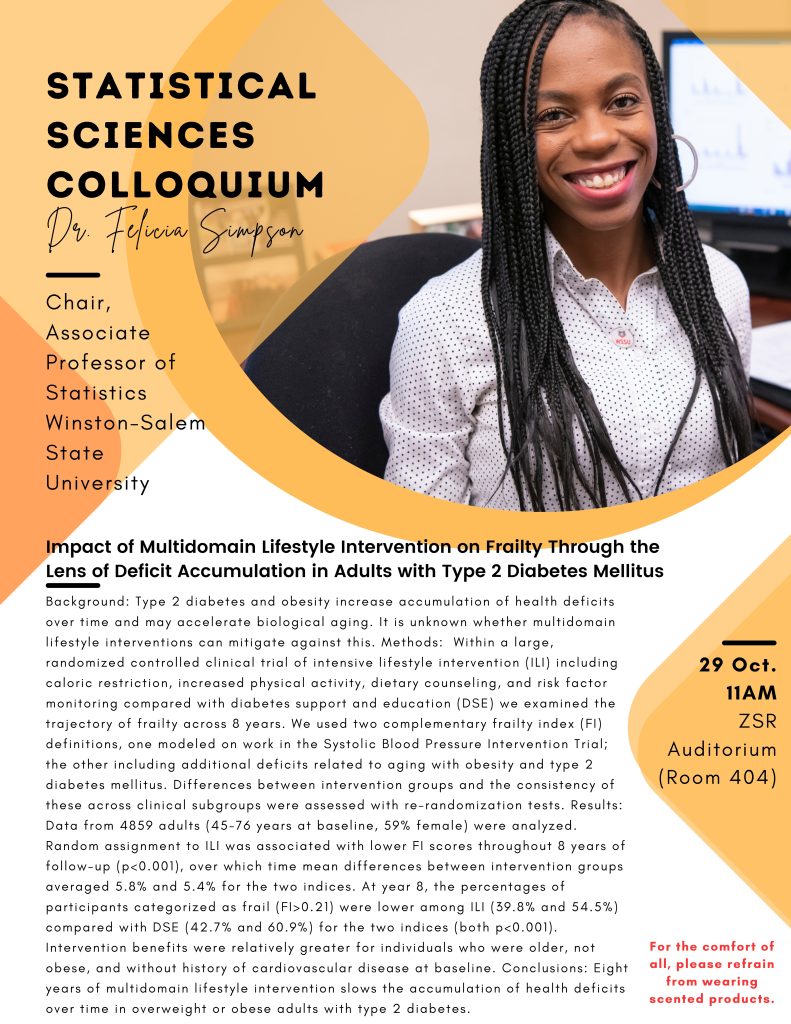COLLOQUIUM: Impact of Multidomain Lifestyle Intervention on Frailty through the Lens of Deficit Accumulation in Adults with Type 2 Diabetes Mellitus

Dr. Felicia Simpson, Chair, Associate Professor of Statistics
Winston-Salem State University
Impact of Multidomain Lifestyle Intervention on Frailty through the Lens of Deficit Accumulation in Adults with Type 2 Diabetes Mellitus
October 29, 11 AM in the Z. Smith Reynolds (ZSR) Auditorium, Room 404.
Background: Type 2 diabetes and obesity increase accumulation of health deficits over time and may accelerate biological aging. It is unknown whether multidomain lifestyle interventions can mitigate against this. Methods: Within a large, randomized controlled clinical trial of intensive lifestyle intervention (ILi) including caloric restriction, increased physical activity, dietary counseling, and risk factor monitoring compared with diabetes support and education (DSE) we examined the trajectory of frailty across 8 years. We used two complementary frailty index (Fl) definitions, one modeled on work in the Systolic Blood Pressure Intervention Trial; the other including additional deficits related to aging with obesity and type 2 diabetes mellitus. Differences between intervention groups and the consistency of these across clinical subgroups were assessed with re-randomization tests. Results: Data from 4859 adults (45-76 years at baseline, 59% female) were analyzed. Random assignment to ILi was associated with lower Fl scores throughout 8 years of follow-up (p<0.001), over which time mean differences between intervention groups averaged 5.8% and 5.4% for the two indices. At year 8, the percentages of participants categorized as frail (Fl>0.21) were lower among ILi (39.8% and 54.5%) compared with DSE(42.7% and 60.9%) for the two indices (both p<0.001). Intervention benefits were relatively greater for individuals who were older, not obese, and without history of cardiovascular disease at baseline. Conclusions: Eight years of multidomain lifestyle intervention slows the accumulation of health deficits over time in overweight or obese adults with type 2 diabetes.
Dr. Felicia Simpson will be presenting at 11 AM in the Z. Smith Reynolds (ZSR) Auditorium, Room 404. Dr. Simpson is the Chair of the Department of Mathematics and an Associate Professor of Statistics at Winston-Salem State University. Prior to joining Winston-Salem State University, Dr. Simpson worked as a Mathematical Statistician at the Center for Drug Evaluation and Research at FDA, Division of Biometrics IV. Her research interests include design and analysis of clinical trials, and metrics of aging, with a current focus on interfaces among aging, diabetes, and lifestyle. Dr. Simpson is an active member of the ASA and International Biometric Society. She currently serves on ENAR’s regional committee. She is passionate about increasing the exposure of statistics and biostatistics among students in underrepresented populations. Dr. Simpson is a member of ASA’s Committee on Minorities in Statistics and served as co-chair for the ENAR Fostering Diversity in Biostatistics Workshop.
